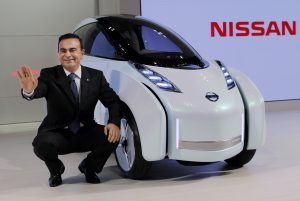THE board of Japanese carmaker Mitsubishi Motors – which is allied with Renault and Nissan – has voted to dismiss Carlos Ghosn as its chairman after his arrest last week.
Prosecutors arrested Ghosn on November 19 on suspicion of under-reporting his income by $44m (£34m) over five years.
Nissan Motor Co ousted him as its chairman last week, saying an internal investigation found Ghosn abused company money and assets.
Mitsubishi said its current chief executive, Osamu Masuko, will serve as both acting chairman and chief executive pending a general shareholders meeting.
It said Ghosn had lost the trust of the company and would find it difficult to continue to act as chairman.
Masuko told reporters the board’s decision was unanimous.
Seven of Mitsubishi Motors’s eight-member board attended yesterday’s meeting, the company said.
Ghosn’s arrest in Tokyo marks a stunning fall for an executive who dominated the Japanese car industry for two decades and spearheaded Nissan’s alliance with Renault SA of France. He also led the addition of Mitsubishi into the alliance.
Nissan took a 34 per cent stake in Mitsubishi in 2016 after the smaller carmaker was embroiled in an inspections reporting scandal.
Japanese media have reported that Ghosn and Greg Kelly, an executive who was arrested on suspicion of collaborating with Ghosn, are asserting their innocence.
Ghosn has not commented publicly and the two executives have not yet been charged.
Under Japanese law, a suspect can be held in custody for up to three weeks per suspected charge without any charges being filed.
Renault has kept Ghosn as chief executive, but considering the make-up of Mitsubishi’s board, little opposition to his dismissal is expected.
The board consists of Ghosn, Masuko, two people from Nissan, two from the Mitsubishi group companies and two outsiders – a writer and an academic.
Worries are growing about the future of the alliance between Renault and Nissan, while the future of the alliance with Mitsubishi, being more recent, could be even more precarious.
Alliances often benefit carmakers because they share technology, parts, plus supplier and sales networks, and sales volume tends to lower costs.
Analysts say such sharing has been growing in importance as companies develop electric vehicles, net connectivity and artificial intelligence for cars.
MORE: Nissan’s board sacks Ghosn after arrest over ‘misconduct’
MORE: Renault and Nissan to merge?
MORE: Nissan buys 34 per cent of Mitsubishi Motors and adds it to alliance


































